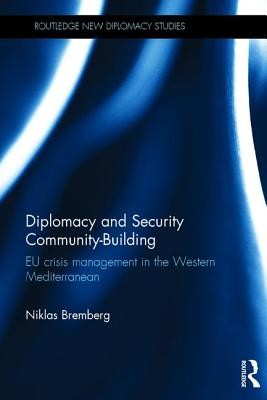
- We will send in 10–14 business days.
- Author: Niklas Bremberg
- Publisher: Routledge
- Year: 2015
- Pages: 200
- ISBN-10: 113892573X
- ISBN-13: 9781138925731
- Format: 15.6 x 23.4 x 1.3 cm, hardcover
- Language: English
- SAVE -10% with code: EXTRA
Reviews
Description
This book contributes to the ongoing debate in IR on the role of security communities and formulates a new mechanism-based analytical framework.
It argues that the question we need to ask is how security communities work at a time when armed conflicts among states have become significantly less frequent compared to other non-military threats and trans-boundary risks (e.g. terrorism and the adverse effects of climate change). Drawing upon recent advances in practice theory, the book suggests that the emergence and spread of cooperative security practices, ranging from multilateral diplomacy to crisis management, are as important for understanding how security communities work as more traditional confidence-building measures.
Using the EU, Spain and Morocco as an in-depth case study, this volume reveals that through the institutionalization of multilateral venues, the EU has provided cooperative frameworks that otherwise would not have been available, and that the de-territorialized notion of security threats has created a new rationale for practical cooperation between Spanish and Moroccan diplomats, armed forces and civilian authorities. Within the broader context, this book provides a mechanism-based framework for studying regional organizations as security community-building institutions, and by utilizing that framework it shows how practice theory can be applied in empirical research to generate novel and thought-provoking results of relevance for the broader field of IR.
This book will be of much interest to students of multilateral diplomacy, European Politics, foreign policy, security studies and IR in general.
EXTRA 10 % discount with code: EXTRA
The promotion ends in 11d.05:48:23
The discount code is valid when purchasing from 10 €. Discounts do not stack.
- Author: Niklas Bremberg
- Publisher: Routledge
- Year: 2015
- Pages: 200
- ISBN-10: 113892573X
- ISBN-13: 9781138925731
- Format: 15.6 x 23.4 x 1.3 cm, hardcover
- Language: English English
This book contributes to the ongoing debate in IR on the role of security communities and formulates a new mechanism-based analytical framework.
It argues that the question we need to ask is how security communities work at a time when armed conflicts among states have become significantly less frequent compared to other non-military threats and trans-boundary risks (e.g. terrorism and the adverse effects of climate change). Drawing upon recent advances in practice theory, the book suggests that the emergence and spread of cooperative security practices, ranging from multilateral diplomacy to crisis management, are as important for understanding how security communities work as more traditional confidence-building measures.
Using the EU, Spain and Morocco as an in-depth case study, this volume reveals that through the institutionalization of multilateral venues, the EU has provided cooperative frameworks that otherwise would not have been available, and that the de-territorialized notion of security threats has created a new rationale for practical cooperation between Spanish and Moroccan diplomats, armed forces and civilian authorities. Within the broader context, this book provides a mechanism-based framework for studying regional organizations as security community-building institutions, and by utilizing that framework it shows how practice theory can be applied in empirical research to generate novel and thought-provoking results of relevance for the broader field of IR.
This book will be of much interest to students of multilateral diplomacy, European Politics, foreign policy, security studies and IR in general.


Reviews